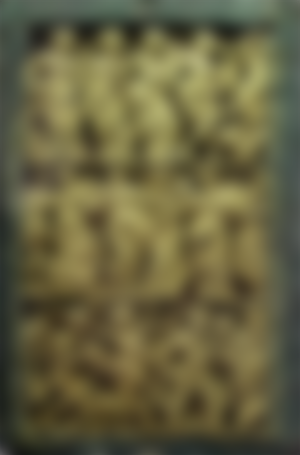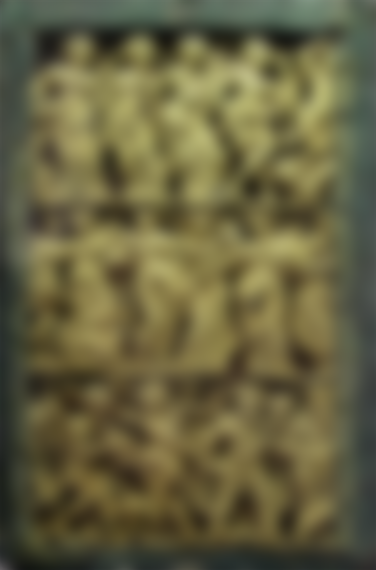Nine daughters of Zeus and Mnemosyne: Polychimnia ("rich in hymns"), Clio ("the one who celebrates"), Melpomene ("singer"), Thalia ("solemn"), Urania ("heavenly"), Erato ("the one who challenges longing ”), Terpsichore (“ player ”), Euterpa (“ the one who pampers ”) and Kaliopa (“ beautiful ”). They were born not far from the top of Olympus. There, near the courts of Harita and Chimeros, they had a beautiful palace and a place to play; from there they went to their father on Olympus, with a song that made the whole country roar. And in Boeotia, at the top of Helicon, the muses played around the altar of Zeus and bathed their delicate bodies in the waters of Permes, Hippocrates and Olmeus. Their song in honor of Zeus and other gods does not stop even at night.
Muses also approach people to reveal true truths, but also many lies similar to the truth. They infuse the poets with a divine song to celebrate the future and the past, they keep their eyes on some king, and they sprinkle sweet dew on his tongue so that honey words would flow from his lips. Everyone is happy when the muses fall in love, because then he gives the most beautiful sermons and is able to sing about the glory of ancient heroes and the blessed Olympian gods. The most famous mythical singers are the sons of certain muses (Orpheus, Lynn).

It is said that the muses are the daughters of Harmony, Apollo or Uranus and Gaia. According to the Boeotian myth, there were first three muses: Meleta (Exercise), Mnema (Memory) and Aoida (Singing). Aloadi, the brothers Ot and Efijalt, were the first to offer sacrifices to three muses on Helicon, and they were respected there until a Macedonian named Pierre came to Helicon and introduced the cult of nine muses. Some say that Pierre had nine daughters, nine false muses (Pierides), who competed with the rights.
The muses sing to Apollo's music and warm the hearts of the gods on Olympus. They delight guests with their song at Kadm's and Harmonija's wedding, as well as at Pele's and Tetida's wedding. They also attended Achilles' funeral. In addition to Helicon, muses often reside in Pieria and at the foot of Parnassus, near the source of Castalia. There they are led in song and dance by Apollo, and in the winter months they join Dionysus.
Muses severely punish those who dare to compete with them in singing. Thus, after the competition with the muses, Pieride was turned into a bird, the mermaids were left without feathers, and the singer Tamiri lost his sight and gift of singing.
A divine song is constantly flowing from the lips of the muse, and they inspire poets and singers to create works that remove sadness and worries. The poet turns to the muses to give him inspiration and immortality, and philosophers beg them for good ideas. Only later, a certain creative activity was tied to each of the muses, and the appropriate attributes were added to them. Thus Erato, with a stringed instrument in his hands, becomes the protector of lyrical poetry, especially love poetry; Euterpa, the patroness of playing the flute, is shown with doubles; Kaliopa, with a scroll and a pen, inspires epic poetry and science, and Clio, with a half-open book in his hands, becomes the protector of history. Melpomene, the protector of singing and tragedy, holds a tragic mask, Hercules' club and a wreath of vines. Polychimnia, the protector of anthems, is presented without attributes, always thoughtful and serious; the protector of the game Terpsichore is depicted with a lyre or plectron; Talia, the protector of comedy, is characterized by a comic mask, an ivy wreath and a curved stick, and Urania, the protector of astronomy, is shown with a globe.

Muses - divine beings who teach and help poets, musicians, dancers and thinkers - were originally nymphs of springs and streams, but over time they became deities of song and poetic inspiration because running water was believed to give prophetic inspiration, that is, to foretell poetry. Muses were first revered in Pieria and Boeotia; Pieria is also the homeland of famous Thracian poets and singers, such as Orpheus, Lynn, Tamirius and Musei, and there are also muses associated with the cult of Dionysus. In the sanctuary of the muses on Helicon, great ceremonies were organized every fifth year, with music competitions (Museums). The cult of the muse is related to all places where science and art are nurtured - to schools, high schools and philosophical circles. Statues of muses were placed in those places.
In fine arts, muses are represented on vases of black-figure and red-figure style, but they have only been shown in monumental art since the Hellenistic era. There is a famous relief from Mantinea (around 330 to 320 AD) and a group of muses that may be the work of the sculptor Philiscus of Rhodes (3rd century AD). Archelaus of Priena presented Homer's apotheosis in the presence of the muses (around 125 AD). A large number of Roman sarcophagi with representations of muses are known, and in late antiquity, muses were represented alongside certain philosophers on ivory diptychs.
Literature:
• Dragoslav Srejović - Aleksandrina Cermanović-Kuzmanović, Recnik grčke i rimske mitologije, drugo izdanje, Beograd: Srpska književna zadruga, 1987


Kaliopi Bukle is a great singer 🙂 Maybe she got name from Greek myths 🙂